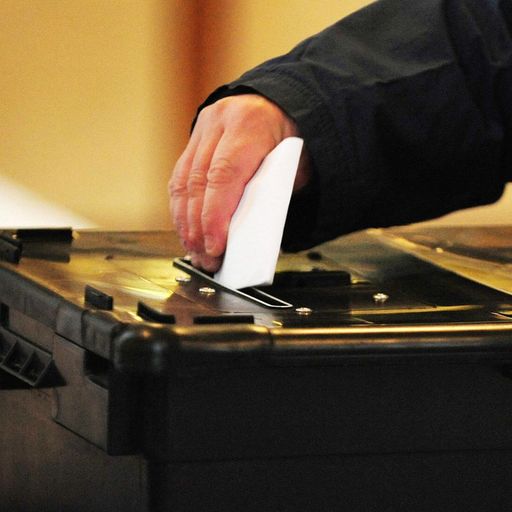Election results: What the data reveals about Labour's performance - and the reasons for it
Saturday 8 May 2021 23:52, UK
Labour's crushing by-election defeat and their losses in council elections across England have left Sir Keir Starmer facing questions about his leadership - and the party's future.
With the latest results coming less than 18 months after Labour's worst electoral defeat in 84 years, there are now calls from both the left and the right of the party for an urgent change of direction.
Here, Sky News delves into the data behind Labour's performance so far at this year's elections in five key locations - and looks at the reasons why the party lost votes.
UK elections live: Follow latest results and reaction as 'Super Thursday' votes counted
Hartlepool
By winning the Hartlepool by-election, the Conservatives have taken a seat that has been under Labour's control since it was created in the 1970s.
Tory candidate Jill Mortimer's victory marked a rare gain for a governing party and delivered another brick in Labour's "red wall" to Prime Minister Boris Johnson.
Ms Mortimer defeated Labour candidate Dr Paul Williams by 6,940 votes to deliver a comprehensive win for the Tories.
Nearly 70% of voters in Hartlepool backed leaving the EU in the 2016 referendum.
Election analyst professor Will Jennings, of the University of Southampton, said the 2021 results showed the Tories were "making largest gains, and Labour feeling most pain, in areas that voted strongly for Brexit".
"Conservatives are hoovering up Leave voters," prof Jennings said.
"That's the stomping ground where the Conservatives are doing really well.
"The results we saw early in the North East reflect the fact those areas tended to vote for Brexit, they're older, more traditional working class who have been drifting away from the Labour Party over quite an extended time period.
"In some ways, Brexit wouldn't have been at the top of people's heads when they went into the polling station but that really has captured the political divide that we're living through."
Dudley
The Conservatives have secured an overall majority to take control of Dudley council in the Midlands, with just three Labour councillors - out of 14 - managing to hang on to their seats.
Prof Jennings said UKIP were "polling strongly" in Dudley in 2016, with virtually every ward at that time seeing support for the party above 10% and even above 20% in places.
"That was an area with a strong tradition of UKIP eurosceptism," he said.
Prof Jennings said in the Dudley ward of Wordsley, which voted by more than 60% for Leave in 2016, there was a more than 40-percentage point increase in Conservative support in the 2021 election.
He said the results highlighted Labour is now "caught in a pincer movement between its new support and older base".
"It needs to find a way to appeal both to voters in its traditional base - who are older, hold more socially conservative views and are more eurosceptic - and it's younger, more diverse new base in cities who are more likely to be graduates," prof Jennings said.
"It faces a major challenge to bridge those divides."
Sunderland
Sunderland City Council remains under Labour control following the local election results but its Labour leader Graeme Miller called it "a bad night".
The party still has 42 councillors but lost nine seats and has just four more than the 38 needed for a majority.
Mr Miller said defeats had been caused by the "complete collapse" of UKIP, with the Tories gaining their votes, and claimed the COVID vaccine rollout had given the Conservatives "a 10-point bounce in the vote".
Prof Jennings said the coronavirus pandemic had "frozen the ability of Labour to define itself or set the agenda".
"In times of crisis, people actually express trust in government, despite the complaints they might have about the handling of the pandemic," he said
"Then the government has been enjoying this kind of vaccine bounce and the feel-good factor of people maybe feeling the worst is behind us."
Prof Jennings said Labour had not been able to "lay a glove on the government because we're in a period of extended crisis where people are looking towards the government to look after them and protect them".
"That's made it a very difficult space to operate in," he added.
Harlow
In Harlow, Essex, traditionally a swing area which voted heavily to leave the EU, the previously Labour council is now fully controlled by the Conservatives for the first time in a decade.
Labour held on to just one of the seven seats it was contesting and council leader Mark Ingall lost his seat.
Prof Jennings said the results for Labour were "clearly bad" but they were not "a shock".
"All the patterns of voting behaviour, the party's structural predicament, are precisely the same as they were in December 2019," he added.
"It is bad it hasn't been able to make any progress since then. It has one excuse - the pandemic, which has limited its ability to reinvent itself.
"What it means is it faces an even greater challenge for whenever the next election might be in two or three years, to shift that around before then.
"That's where it faces a long-term challenge that probably goes beyond a single election."
Northumberland
The Conservative Party seized total control of Northumberland County Council by one seat.
There were dead heats in two wards - where the candidates with most votes got exactly the same number - and the winners were decided by picking lots out of a box.
The Tories ended up with 34 seats - a majority of one, with Labour on 21, seven independents, three Liberal Democrats and the Green Party on two.
Prof Jennings said "what we traditionally understood as Labour strongholds and Conservative strongholds are changing".
"The map of English electoral politics has been redrawn and will continue to change, very much structured by the forces of Brexit and also Boris Johnson," he said.

